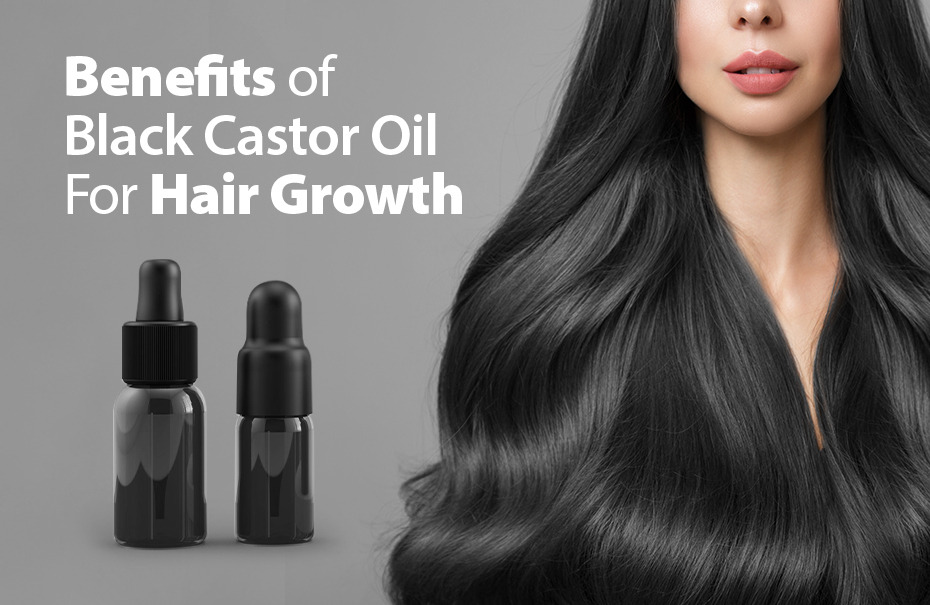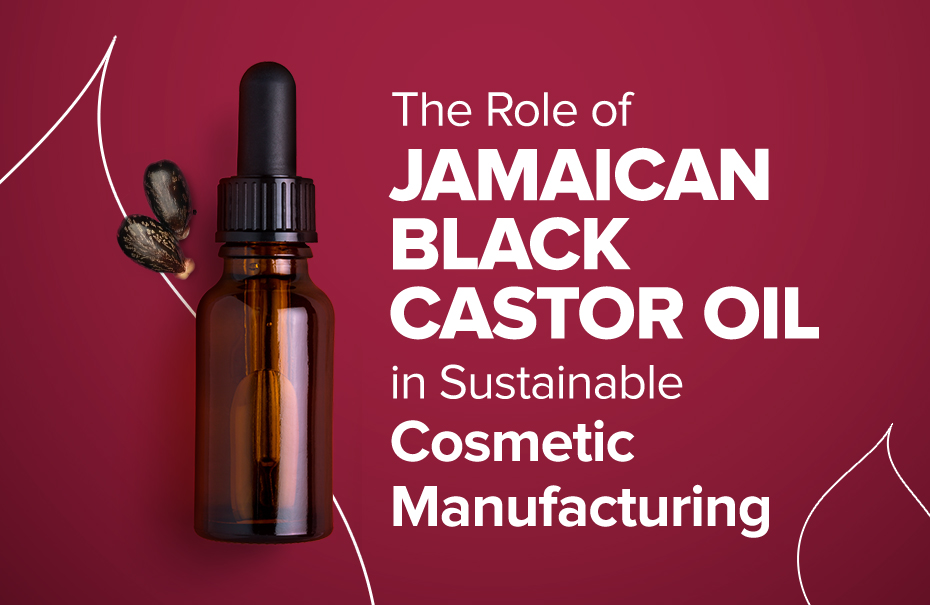Benefits of Black Castor Oil for Hair Growth

“Pale Yellow” – all the while you might have heard the same description about castor oil which is the regular castor oil but, did you know there’s also a black one called the Jamaican Black Castor Oil, and it’s like a blessing for hair growth?
Castor oil is a long-known remedy for various hair problems. From promoting healthier hair, increasing blood flow to the scalp, boosting hair growth, and moisturizing dry scalp, to treating hair conditions like hair loss, dandruff, infection, itching, psoriasis, etc., castor oil has been a part of the hair care regimen for centuries.
There are two types of castor oil available today – Yellow and Black. Obtained by pressing fresh castor beans, the transparent yellow-colored castor oil is called cold-pressed castor oil while the one made by roasting the castor beans and then using heat to extract the oil is the black castor oil. Since the method of obtaining castor oil by roasting was developed in Jamaica, it began to be known as Jamaican Black Castor Oil (JBCO).
Jamaican Black Castor Oil: Overview
Jamaican Black Castor Oil is no latest innovation. It too is obtained from the castor beans, only the method of extraction of oil differs which results in an entirely different substance with different uses.
Jamaican black castor oil (JBCO) is extracted using the traditional method. Firstly, seeds from the Ricinus communis plant or Jamaican castor beans are roasted and then pulverized in a mortar. Water is added to these mashed beans which are then slow-boiled on a wood fire. The result of this preparation is unadulterated, pungent, thick, and dark brown oil that we call Jamaican black castor oil, which is rich in ricinoleic acid.
Jamaican Black Castor Oil Vs. Castor Oil
Since both oils are sourced from the same castor beans, there is not much difference in their properties. They both have high amounts of ricinoleic acid and are rich in antioxidant, antimicrobial, and anti-inflammatory properties but still are considered different due to the following.
The Method of Processing – The regular castor oil is produced by pressing fresh castor beans where no heat is involved and hence is called cold-pressed castor oil but it often undergoes more commercial processing, whereas the Jamaican is processed traditionally (and without adulteration) by first roasting the beans resulting in an oil that smells burnt but is pure and much superior in terms of its nutritional content.
The Color – A clear difference between the two is the color as one is pale yellow while the other is dark brown or black due to the roasting.
The pH Level – Another major difference is the pH level in both castor oils. The regular one is slightly acidic, whereas its Jamaican cousin, given it contains the ashes of the beans, is on the alkaline side.
Nutrition Profile – Although castor oil no matter in what form have its own individual set of benefits, JBCO seems to have the upper hand here. Given its unadulterated method of processing, Jamaican Black Castor Oil has a richer nutritional profile than regular castor oil.
Benefits of Black Castor Oil
Although black castor oil is praised majorly for its miraculous effect on hair growth, it also has a pool of other benefits for skin and overall health which cannot be ignored and hence is used extensively by people of all ages.
Jamaican black castor oil is not just oil for hair problems, in fact, the sky is the limit when it comes to the use cases of JBCO because this versatile oil has a long list of applications and a plethora of advantages a few of which are mentioned below.
Starting with the skin, the black castor oil may work wonders because it is a natural cleanser with antibacterial qualities. The omega-9 fatty acids in Jamaican black castor oil contribute greatly to skin health. It can soothe inflammation due to acne, prevent early aging signs, moisturize dry skin, help fight and treat skin infections like ringworm, heal or reduce the appearance of scars, heal chapped lips, and control our skin’s sebum production.
Whereas due to its medicinal properties, JBCO is used in improving digestive ailments. It works great as a stimulant laxative and upon consuming in small amounts, the ricinoleic acid in castor oil binds to the receptors on the muscle cells of the intestinal walls and provokes them to contract and push out the stool, effortlessly.
Note: Excess consumption of Jamaican black castor oil may have side effects such as nausea, cramping, vomiting, etc. Thus, always consult a physician first before trying at home.
Black castor oil has also proven to be an effective remedy for muscle and joint pains, even if they are severe such as arthritis. It is used either as a mask or directly massaged onto sore joints where it gets absorbed in the skin, penetrates the joint, and reduces pain and inflammation.
Some anecdotal evidence suggests that the Jamaican variant of castor oil can help cure insomnia. Applying one to two drops of the oil to your eyelids and gently massaging them for a few minutes can help induce long hours of sleep.
Another surprising benefit of JBCO is that it helps in improving respiratory health by breaking down and drawing out the stored toxins and congestion from our lungs.
Last but not least, JBCO can help address menstrual cramps even before they begin and as per certain testimonies, can also help in treating external hemorrhoids and cysts, and nodes.
How Jamaican Black Castor Oil Aids Hair Growth?
Have a history of unruly, damaged hair, or are simply looking for a natural solution to maintain the health of your hair? Jamaican black castor oil has all the healing powers and nourishment that your hair needs.
For hair growth – Massaging black castor oil on the scalp improves blood circulation, thereby encouraging hair growth. Due to the higher pH level in it, JBCO helps in clearing clogged pores as well as open cuticles which leads to increased hair growth as well as thickening and strengthening of the hair. You can either simply massage it on your scalp and wrap a warm towel for 10 minutes and take a shower/leave overnight or can make a mix of one teaspoon black castor oil, one tablespoon coconut oil, and five drops of essential oil of your choosing, (preferably peppermint oil) and store it in a bottle to massage your scalp as and whenever needed.
For dry scalp – Loaded with rich nutrients such as vitamin E,omega-6 fatty acids, and omega-9 fatty acids, black castor oil can deeply moisturize your dry scalp and treat related problems like itchy scalp and dandruff. Simply mix 1 tablespoon each of Jamaican black castor oil and extra-virgin olive oil, and the juice of half a lemon and warm the mixture slightly. Massage your scalp for about 10 minutes and leave it on for 30 minutes or overnight. Rinse and notice the difference.
For split ends – One of the commonest complaints regarding hair is split ends. Don’t worry, you can get rid of it by applying an equal mix of black castor oil and mustard oil. Doing this twice a week gives you frizz-free hair and treats split ends, isn’t that great?
For dandruff – Battling dandruff can be depressing but not anymore if you add JBCO to your haircare routine. Mask your hair with a smooth paste of 2 tablespoons of JBCO and yogurt at least once a week to get rid of itchy and dry skin flakes and achieve a dandruff-free scalp and soft and shiny hair.
Similarly, you can mix any essential oil with Jamaican black castor oil, massage your scalp well, and leave for an hour or overnight to soak all the nutrients of it into your hair follicles and achieve thicker, fuller, and shinier hair.
Black or Yellow? Choose the Best For Hair
As we said before, both regular and Jamaican black castor oil are best for hair but the Jamaican is proved to be more beneficial for hair growth and other hair-related problems due to its rich nutrition profile.
Whatever you choose, make sure to buy it from a trusted source like Ambuja Solvex which manufactures both yellow and black castor oil in its pure form without any chemicals or adulteration.



